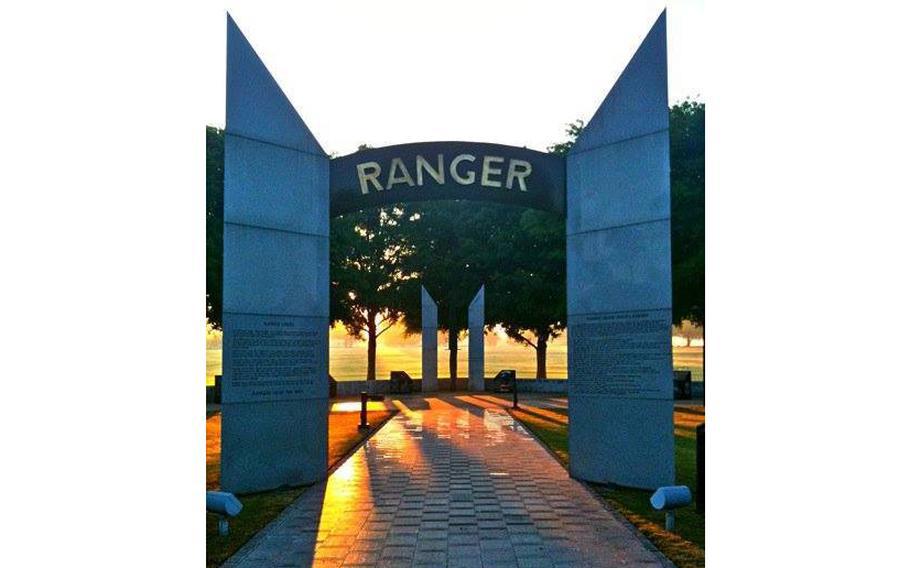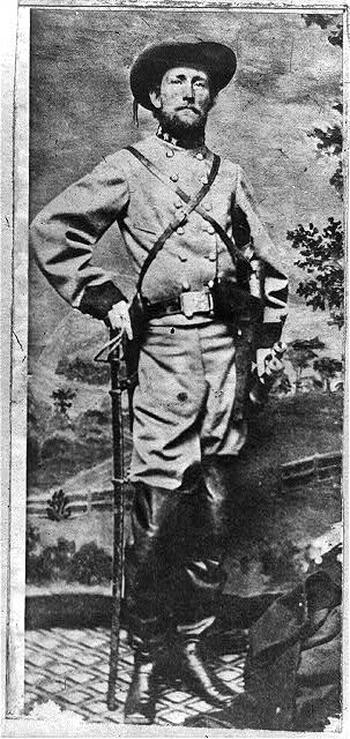
The Defense Department is being sued by the National Ranger Memorial Foundation to reinstate the name of Confederate Col. John S. Mosby to Fort Moore’s Ranger Memorial and as a member of the Ranger Hall of Fame. (National Ranger Foundation/Facebook)
ATLANTA — A foundation suing to have a Confederate officer’s name reinstated to the Army’s Ranger Hall of Fame and memorial at Fort Moore, Ga., will get the chance to make their case to a federal judge on Thursday.
The hearing in Columbus, which is just outside of the Army base, will examine the merits of the National Ranger Memorial Foundation’s lawsuit, which seeks to reinstate the name of Col. John S. Mosby on the installation’s Ranger Memorial and as a member of the Ranger Hall of Fame.
The foundation argues in the suit, which was initially filed in September 2023, that Fort Moore officials overreached in removing Mosby’s name from the memorial last year as part of a sweeping, yearslong effort to strip Defense Department assets of names linked to the Confederacy.
Barry Todd, the foundation’s president, said base leaders overstepped their authority in removing Mosby’s name. The Ranger Hall of Fame and the Ranger Memorial, he said Tuesday, are managed and overseen by private entities, including his group, which built and maintains them through private donations.
“The memorial was built and paid for by the Ranger community, all through donations,” Todd said. “The Army … in 1992 and 1993 said they would accept it as a conditional gift, on the condition that they don’t have to pay for [it]. So, there’s no taxpayer money at all toward the Ranger memorial.”
He said the overarching view in the Ranger community is Mosby’s name should remain.

Undated photo of Col. John S. Mosby, a Confederate cavalry commander known as the “Gray Ghost” for leading daring raids on Union forces. (Library of Congress)
Fort Moore officials have said they were simply following orders from the Pentagon when they removed Mosby’s name. Justice Department lawyers, representing the Pentagon in the case, have moved to have the lawsuit dismissed, arguing Army officials acted lawfully and under the orders of Defense Secretary Lloyd Austin to remove all names and items associated with the Confederacy from the installation.
The decision to remove Mosby’s name from the Ranger memorial – alongside three other Confederate-linked names – grew from congressional efforts to strip names and items honoring Confederates from Defense Department installations and inventory. That mandate was included in the 2021 National Defense Authorization Act, the annual law the sets Pentagon policy and spending priorities. That law established the so-called Naming Commission, which spent more than a year studying the issue and eventually called for the removal of thousands of items and the renaming of nine Army installations, including Fort Moore, which was previously named Fort Benning in honor of Confederate Brig. Gen. Henry Benning.
In the commission’s September 2022 report, the group identified the four names to be removed from the Ranger Memorial, among hundreds of other names and items to be removed at other locations at the former Fort Benning. Austin later ordered all entities within the Defense Department to implement the changes recommended by the commission by the end of 2023.
Leaders at Fort Moore, which is home to the Army’s Ranger School, the 75th Ranger Regiment’s headquarters, its 3rd Battalion and the annual Best Ranger Competition, said they worked for months to scrub the installation of items identified by the Naming Commission, including the references to Mosby.
But Todd said the Defense Department did not consider the Naming Commission’s full criteria in removing Mosby’s name, which the foundation has argued was supposed to include an examination of a person’s merits before and after the Civil War to determine whether items associated with their name should be removed.
Todd argued Mosby was “an honorable man,” which was part of the reason that he is the only Confederate ever inducted into the Ranger Hall of Fame.
Mosby was a lawyer who became a Confederate cavalry commander known as the “Gray Ghost” for leading daring raids on Union forces. Mosby joined the Confederate army in 1861 out of loyalty to his family and his native state of Virginia even after opposing secession and slavery, he claimed in his memoirs.
After the Civil War, he reconciled with the U.S. government, endorsed President Ulysses S. Grant and went on to serve as an assistant U.S. attorney general and Grant’s U.S. consul to Hong Kong.
In Mosby’s post-war writings, he described slavery as “a monstrous thing” and wrote he had no animosity toward the northern states.
Mosby was one of the initial members enshrined in the Ranger Hall of Fame when it was formed in 1992. He was inducted alongside Ranger legends such as Vietnam War Medal of Honor recipient Spc. 4 Robert Law, World War II heroes Maj. Gen. Frank D. Merrill and Brig. Gen. William O. Darby, and Gen. Creighton Abrams, who as Army chief of staff permanently established the 1st and 2nd Ranger battalions in 1974.
Mosby was selected for the initial Ranger Hall of Fame class because of his “outstanding service to the Confederate Army as a Ranger-type leader,” according to his Ranger Hall of Fame citation. His tactics in guerilla warfare are still studied in military academies and by troops today, Todd said.
Blair Brown, the National Ranger Memorial Foundation’s vice president and executive director, said he expects a large turnout in support of the foundation’s lawsuit in court on Thursday.
“Mosby was a unanimous selection into the Ranger Hall of Fame by the Ranger community,” he said. “This is non-biased, non-political. This is a fight for a Ranger we believed was wronged.”